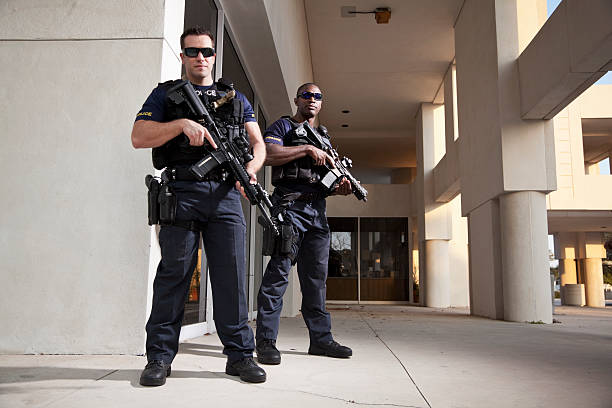An armed security guard is someone who helps keep people and places safe. They are trained to protect businesses, hospitals, banks, and even schools. They carry weapons like guns because they may need them in dangerous situations. In the United States, armed security guards are becoming more important every year as safety concerns grow.
Who Is an Armed Security Guard?
An armed security guard is a professional who protects people, property, and valuable assets while carrying a firearm or other defensive equipment. Unlike unarmed guards, they go through strict training and licensing because they are trusted with weapons.
These security officers work for private companies, government agencies, or directly with individuals who need extra protection. They are not police officers but can act as a strong first line of defense when something goes wrong. They monitor surroundings, stay alert, and step in if there is danger.
For example, if a high-profile company is worried about theft, they hire an armed guard to patrol the area, check who’s coming in and out, and respond quickly to threats. This role requires responsibility, quick thinking, and excellent communication.
Why Do We Need Armed Security Guards?
We need armed security guards because the world isn’t always a safe place. Crimes like theft, vandalism, and even shootings can happen anywhere. Armed guards provide a visible sign of safety and can stop trouble before it begins.
They also make people feel secure. Imagine walking into a hospital late at night and seeing a trained security officer at the entrance—it gives peace of mind. Businesses that handle cash or sensitive information, like banks or data centers, rely on these professionals to protect employees and customers.
In emergencies, an armed security guard can take control of the situation before the police arrive. This fast action can save lives and property.
Where Do Armed Security Guards Work?
Armed security guards work in many different environments across the United States. Some locations require a constant security presence because of high risks, while others only need them during certain hours or events.

Hospitals and Medical Centers
Hospitals are open 24/7, and they deal with emergencies, patients, and visitors at all hours. Armed security guards help control access to sensitive areas like emergency rooms, prevent theft of medical supplies, and protect staff from aggressive behavior.
They also assist during violent incidents, ensuring doctors and nurses can focus on saving lives without worrying about their own safety.
Airports and Transportation Hubs
Airports are busy and often targeted for crime or even terrorism. Armed guards are positioned at checkpoints, baggage claims, and entry points to keep travelers safe. They work closely with federal agencies like the TSA to ensure no prohibited items or dangerous individuals get through.
In bus stations and train terminals, they watch for suspicious activities and help maintain order during crowded times.
Banks and Financial Buildings
Banks hold large amounts of cash and valuables, making them a prime target for robberies. Armed security guards stand as a deterrent to criminals. They monitor surveillance systems, escort cash deliveries, and respond immediately if someone attempts a break-in or robbery.
Financial buildings often also deal with sensitive client information, and guards ensure only authorized personnel gain access.
What Training Does an Armed Security Guard Need?
Becoming an armed security guard requires much more than wearing a uniform and carrying a gun. In the U.S., each state has its own laws about training and licensing, but most have similar requirements.
First, candidates must complete a basic security guard course. This teaches observation skills, emergency response, and how to write reports. Next comes firearms training. Here, guards learn about gun safety, shooting accuracy, and when it is legal to use their weapon.
They also study laws about self-defense and the rights of private security. Many states require background checks, fingerprinting, and psychological evaluations before issuing a permit to carry a gun. Some employers also provide additional training in first aid, crowd control, and conflict resolution.
Continuing education is often necessary so guards can stay updated on new laws and techniques.
How Much Do Armed Security Guards Earn?
The salary of an armed security guard in the United States depends on location, experience, and industry. According to recent data, the average pay ranges from $35,000 to $60,000 per year.
Guards working in high-risk environments like nuclear plants, government buildings, or VIP protection can earn even more—sometimes upwards of $80,000 annually. Hourly rates usually start around $15–$25 per hour but can go higher with overtime and special assignments.
States like California, New York, and Texas often pay better because of higher demand and living costs. Guards with additional skills like EMT certification or bilingual abilities may also negotiate higher pay.
What Are the Duties of an Armed Security Guard?
Armed security guards do much more than just stand at a door. Their job combines observation, prevention, and action to maintain safety.

Watching and Patrolling Areas
Guards regularly walk or drive around their assigned areas to look for anything unusual. They check doors, windows, and fences to make sure everything is secure. Patrolling deters crime because potential offenders know someone is watching.
Responding to Emergencies
When an emergency happens—like a fire, medical crisis, or security breach—an armed guard is trained to act quickly. They may call 911, assist injured people, or even use their weapon if lives are at risk.
Checking Entry Points and Visitors
At many locations, guards are responsible for screening visitors, checking IDs, and making sure only authorized people enter. They may also inspect bags or vehicles to prevent contraband from being brought in.
In some cases, they monitor security cameras and alarms to spot problems before they escalate.
What Makes a Good Armed Security Guard?
A good armed security guard is calm, observant, and responsible. They must have excellent judgment because carrying a weapon is a big responsibility. Good communication skills are important too—they need to talk to people politely, give instructions clearly, and defuse conflicts without violence whenever possible.
Physical fitness helps, but mental strength is even more important. Guards often face stressful situations and must stay professional at all times.
The Bottom Line
Armed security guards play a critical role in keeping people and property safe across the United States. From hospitals to banks, they provide peace of mind and a rapid response to threats. With proper training, professionalism, and dedication, these guards are a vital part of our security system.
If you’re considering hiring one or becoming one, know that it’s a serious job requiring skill, trust, and constant vigilance. But for those who are prepared, it’s a rewarding career that makes a real difference.







